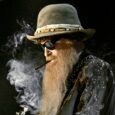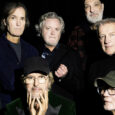ALMOST A SATIRE OF WHAT A ROCK STAR WAS
A CONVERSATION WITH BOB WEGNER: MUSIC HISTORIAN AND AUTHOR OF MAX WEBSTER: HIGH CLASS
Anyone who grew up in Southern Ontario in the mid to late 1970s will remember that it was a golden age of seeing bands live in clubs, bars, or wherever they could get a gig. One of the bands that played the circuit and paid their dues was Max Webster. They began in 1972 and by 1976, when they released their debut album, Max Webster, their line-up included Kim Mitchell (guitars and vocals), Mike Tilka (bass and vocals), Terry Wilkinson (keyboards and vocals) and Paul Kersey (drums). Pye Dubois was there Keith Reid and wrote the lyrics, while Mitchell wrote the lion’s share of the songs. That album was the beginning of a career that spanned until 1981 and Max Webster went down in rock history as one of the most unique, funny and talented bands of that era.
Bob Wegner, who is a musician as well as a writer and radio host, is a huge fan of the band. He has written what could be considered the definitive biography of the band and he has put together a coffee table book which is full of incredible pictures and stories, Max Webster High Class. Although he was too young to have seen the band when they were together (Wegner jokes “the band broke up when I was minus one”), there was something about their music that he enjoyed.
“This band was on the radio. You listen to Zeppelin, The Beatles, Floyd and then Max Webster. You don’t know the difference when you are nine, it is not until later on that they didn’t exist anymore. It is just the music you grow up with. To me, growing up, they were just as significant as Zeppelin. And they still are to me.”
This love of the band led Wegner to discover a great deal about Max Webster, and perhaps most importantly, finding out that this had not been documented.
Besides loving the band, there was something in their sound that set them apart from other bands for him. “I’ve been listening to this music for about 30 years and it is still interesting. It is still stimulating, and I love the arrangements. These songs are just so interesting, as a musician to listen to this stuff. And you quickly realize that they were a live band more than a studio band. There are all these concert recordings of this band, and when you watch the super 8 footage you see just how unhinged, in all the right ways, this band was. I love the albums, I go after the live stuff, because they were a live band. I have all these great tapes from when they were a bar band all the way to end. But that period from their first album to High Class In Borrowed Shoes (1977), what a great band.”
Wegner also explained the difference between Max Webster and other bands at the time. Whereas other bands were trying to replicate the sound night after night, Max Webster were different.
“They never played their tunes the same way twice, always spontaneous, interesting and the banter between the songs was wonderful and goofy. They were kind of like The Who Sell Out with all the little ads, that was what they were like in concert, especially in the early years. They had these jingle type things that they would do between songs. It was almost a parody of a band. They were just making fun of everything that had become so commonplace. They basically embodied themselves as almost a satire of what a rock star was.”
And even though this band would go on to earn a star on Canada’s Walk OF Fame, they never achieved the fame that they so obviously deserved. Wegner looked at this fact as well.
“Money, 95% of bands that break up, break up because of money. Max were never going to make it in America. They were too left of centre, and weird and quirky. They didn’t write radio hits; it was not going to happen. Rush made it in America because they wrote “Working Man” and they got picked up by radio. Max Webster didn’t have a song like “Working Man”. They absolutely could have and should have made it in Europe. But to get you out there, back then, you needed the money behind you. How it worked back then was that your American record label would finance those tours after you made money for them, and Max never made money for their American labels. Their records didn’t get a lot of airplay. There records were not in the stores to begin with, and the records were pressed. But back then they would press records, not put them in the shops and call them tax write-offs. And they just burned them, and almost certainly that is what happened to Max Webster.”
Yet, here in Canada, the band developed a large and loyal following.
“Domestically, they could not have done much better. They headlined Maple Leaf Gardens three times in 18 months. They would do The Commodore in Vancouver, and the Winnipeg Arena. They were headlining all those places by 1979 and 1980, and they were doing as well as they could in Canada, but if you don’t break in America, then you are not going to see the money that will take you elsewhere. In England, Max were doing great. They had their single “Paradise Skies” in the top 40 and it sold 250, 000 copies. They even were on The Top Of The Pops.”
Wegner has worked very hard on the book. Kim Mitchell and other people associated with Max Webster have applauded the work and he hopes fans will enjoy it as well.
“If it is someone who knows the band really well, then at the very least, it will connect people with memories of theirs and what it was like to see this band. You hope they discover new things about them and make them love the band even more. If it is people who don’t know the band well, you might look at the photos of Kim in Champion spark plug and think that this has to be a seriously interesting band, because who does that? “









